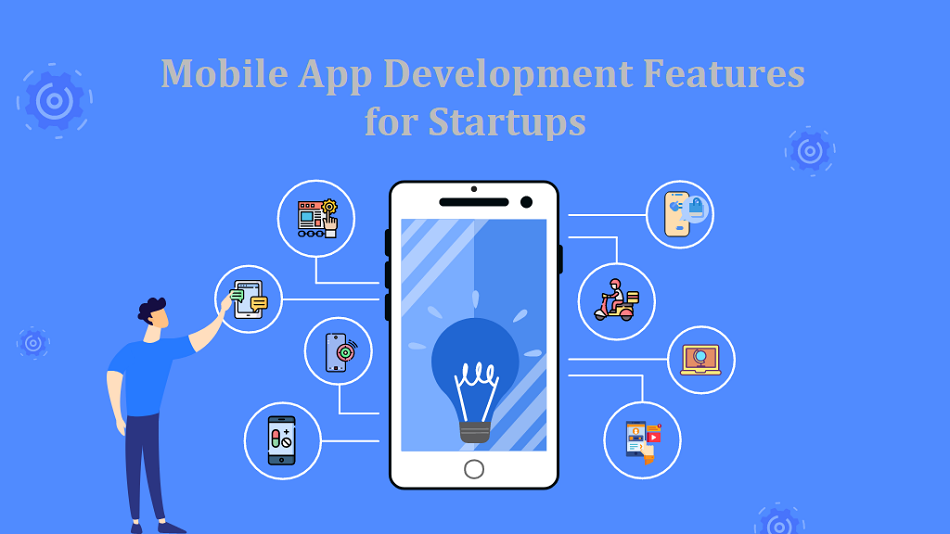Mobile App Development Features for Startups: Key App Features
The average time spent on mobile apps has reached four hours and 48 minutes and users in Brazil, Indonesia, and South Korea have surpassed five hours per day making app development. An integral aspect for a start-up’s growth and ability to compete with bigger, established brands and the mammoth 92% of time people spend on mobile apps makes this field ripe for utilization.
In order to choose the right feature your app needs, you need to evaluate certain aspects of your start-up and accompanying application. You need to choose a problem you want to solve, know your target audience, set your priorities, and create a detailed mobile app Product Requirement Document (PRD) to get started, and app development companies for startups can be of great help in this regard.
Certain app features are critical for engaging clients, keeping them pleased, and encouraging them to connect more with the app. Some elements of small companies or startup apps have been critical in determining their digital footprint’s success.
Through this article, we shall discuss some startup or small business app features and important ways of picking them if you’re thinking about how to design an app for your startup.
App Onboarding with Social Media Integration
Quick login, which allows for a smooth onboarding experience, is one of the most important mobile app development aspects. You can easily assist consumers in completing the registration and login procedures by integrating social media. Users can submit legitimate credentials instead of registering a new username and password by clicking on the integrated social networking icon.
Because the majority of app users utilize one or more social networking networks, this app feature will allow them to log in faster and begin using the app right away. App onboarding via integrated social media networks, on the other hand, gives businesses access to important user data such as the following.
- User profile images
- Email addresses
- User interests
- User preferences
Geolocation
Geolocation monitoring is still one of the most important mobile app development features for sales-focused firms. On-demand delivery applications, in particular, leverage this capability to assist clients in tracking the position of delivery workers. The same software function also guides delivery staff on delivery routes, allowing them to make speedier deliveries. Most on-demand applications, such as Uber and Zomato, are excellent instances of geolocation tracking.
This looks to be one of the most significant mobile app features for firms with a high number of on-field staff, a fleet of cars, and logistics.
Through real-time geolocation monitoring, a company can quickly track its staff, cars, and freight and assure seamless operation and can easily start following its personnel, cars, and goods using real-time geolocation tracking and assure seamless operation.
Dashboard for App Analytics
This is a must-have feature for startup apps since they must pay closer attention to crucial business KPIs and performance indicators than established and large company brands. A small firm or startup should maintain a tight eye on traffic flow, use habits, session duration, frequency of user footprint, and so on.
A mobile app development company might incorporate essential KPIs regarding sales and other operations based on the individual business specialty. It is critical to integrate these many KPIs and vital indicators into a user-friendly and easily accessible dashboard.
Mobile Wallets
All companies want mobile wallets for their clients to use when making payments. They are the least time-consuming, have been evaluated for security problems, and have nearly no worries about performance issues such as failed transactions.
It’s no surprise that small companies and startup applications that use mobile apps to expand sales outside their physical locations always prefer integrating mobile wallets. When allowing clients to pay by mobile wallet, one should focus on selecting various popular wallet applications and services to reach your audience in target locations. Almost all mobile e-commerce apps accept payment via GPay, Apple Wallet, Amazon Wallet, and a variety of other services.
Security Features
Finally, guaranteeing the highest level of security for consumer transactions and data is critical to the brand’s existence. Naturally, regardless of the app specialization, mobile app development aspects related to security should be given top importance. When you handle a large amount of client data, it is your obligation to protect it from unauthorized access or security breaches.
Customers will lose faith in your company if the security of their data and in-app transactions is compromised. Naturally, all of your future development opportunities are dependent on how well you protect the app’s data.
The unwavering focus of app development features remains security.
Let us now present a list of app features that play an important part in in-app security:
- Encryption of data
- Biometric data and two-step verification are used for strong user authentication.
- App updates automatically with needed security fixes and upgrades
- A built-in recovery method to safeguard the app’s data in the event of a crash.
- A backup method for restricting access and preventing data transmission in the event of an unexpected assault.
Chatbot Assistance & Personalized Communication
Chatbots have become the new standard for modern customer service. It’s have also evolved into personalized suggestion tools and guiding assistants to aid clients in navigating. Chatbots have quickly become one of the most sought-after and popular app development features.
According to a Gartner poll, over 46 percent of small & medium-sized firms have either begun utilizing chatbots within the next few years.
When implementing chatbots, a company may choose between basic rule-based chatbots that respond with prepared replies based on static queries. Intelligent chatbots driven by artificial intelligence (AI) or machine learning (ML) technology. Intelligent chatbots are more successful at leading client interactions, proposing appropriate items based on individual intentions, and resolving customer issues based on context.
Aside from guaranteeing a pleasant and pleasurable customer experience, chatbots via a mobile app assist a business in gathering a wealth of customer data & data-driven insights. Chatbots are used by on-demand delivery applications like Zomato to answer consumer complaints in real-time.
Personalization as an active component of apps, however, does not end with chatbot messages. App alerts and in-app messaging are two of the most important features in making the app popular for each user and making them visit regularly.
Notifications and in-app messages that are personalized & highly context-aware, and are provided based on user intent and context. You should deliver your profitable offers just when a user is in the correct frame of mind to look at them. Aside from time, various distinct triggers differ from one user to the next. The effectiveness of your customer communication is determined by your ability to use notifications and messages depending on these triggers.
Many on-demand and sales-focused applications provide personalized and dynamic menu selections as another approach to serve consumers straight away in a customized manner. Allow consumers to select their favorite quick-access menu items and to configure specific parameters and labels to navigate and complete tasks fast. Behind the scenes, a machine learning system adapts to individual consumer preferences and usage habits over time and enables rapid access to their chosen menu items.
Lisha Arora
Lisha is the Head of Marketing of Whizcamp, leading Web & Mobile App Development Company based in India. She is the chief mentor and strategist with over 5+ years of experience.

